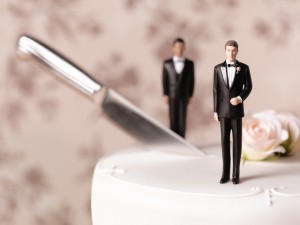Does Marriage Equality Mean Divorce Equality? LGBTQ Rights after Same-Sex Marriage

Humanists have long been allies of the LGBTQ community. Since the 1970s and long before favoring marriage equality was popular, the American Humanist Association has supported the rights of LGBTQ individuals to live authentically. And in opposition to conservative religious views that condemned human sexuality as shameful, the AHA has long maintained a bold stance that sexuality is an integral part of the human experience and that everyone should have the right to enter into consenting, mutually affirming relationships. The visions of humanist and LGBTQ activists were finally realized in June 2015 when the United States Supreme Court declared that the marriages of same-sex couples must be recognized throughout the nation.
This decision was certainly cause for much celebration among advocates for marriage equality, but it didn’t end the fight for equal rights for LGBTQ individuals. USA Today reports that in twenty-eight states, an employee’s sexual orientation or gender identity can be grounds for termination, and Forbes explains that LGBTQ individuals can legally be discriminated against in housing because the federal Fair Housing Act fails to include gender identity or sexual orientation as protected classes. The American Civil Liberties Union also keeps a regularly updated list of attempts across the country to deny LGBTQ individuals their basic rights under the guise of “religious freedom.” Under these circumstances, some religious businesses owners and employers want special privilege to discriminate and hide behind RFRA (Religious Freedom Restoration Act) legislation as an excuse to deny services or employment to LGBTQ individuals.
Another aspect of LGBTQ rights that’s often overlooked concerns divorce and parenting. Now that same-sex couples can legally marry in all fifty states, their rights to divorce should, presumably, also be upheld, as should the rights of LGBTQ parents. On March 7, 2016, the US Supreme Court further affirmed LGBTQ rights by granting a lesbian mother rights to adopted children she had with her former partner. According to the Huffington Post, the woman known as “V.L.” in court papers has three children conceived through reproductive technology with her partner of fifteen years (identified as “E.L.”). When the family lived in Georgia, V.L. legally adopted the children, and the family later moved to Alabama. In 2011, when the couple ended their relationship, E.L., the children’s biological mother, attempted to deny V.L. rights to their children, and the Alabama Supreme Court voided V.L.’s parental rights. The US Supreme Court has, however, issued a summary judgment reversing that decision and granting V.L. her parental rights.
While this case hasn’t attracted nearly as much attention as the marriage equality case last year, it’s still vitally important to LGBTQ individuals in this country because it affirms their parental rights. LGBTQ parents who legally adopt children should have the same rights as parents who are part of heterosexual couples. LGBTQ parents should also be able to retain their parental rights when they split from or divorce their partners, just as divorced heterosexual couples may also retain their parental rights (barring abuse or other serious reasons why a parent may be deemed unfit, of course).
Full equality for LGBTQ individuals does not only mean marriage equality, though marriage equality has been a key issue for legitimizing and upholding the rights of those in the LGBTQ community. Full equality for LGBTQ individuals means advocating for rights and protections in all aspects of our society where people face discrimination because of their gender identity or sexual orientation. The US Supreme Court has upheld LGBTQ individuals’ parental rights, and this is a significant step for the LGBTQ community in achieving full equality. While humanists are still celebrating marriage equality, we should also continue to recognize the threats to LGBTQ equality in the form of RFRA legislation promoted by the religious right and in the form of housing and employment discrimination. As long-time allies of the LGBTQ movement, humanists should continue fighting for full social and economic equality for LGBTQ individuals.
